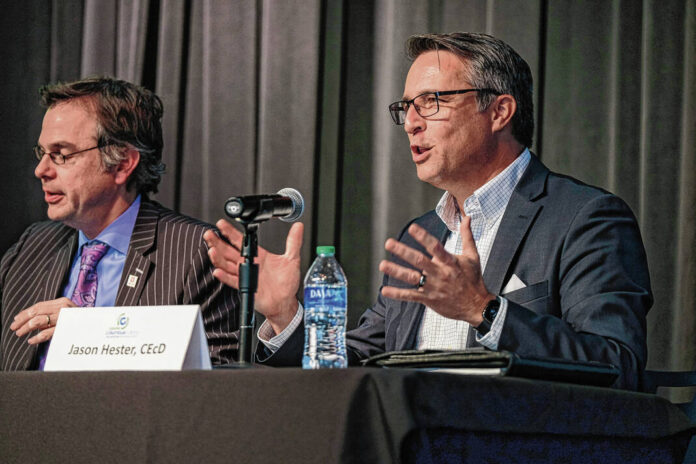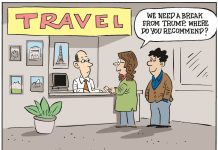
Jason Hester, president of the Greater Columbus Economic Development Corporation, speaks during an annual economic outlook forum at The Commons in downtown Columbus on Nov. 14.
Mike Wolanin | The Republic
Apparently doing a U-turn from prior proposals for paid parking downtown and other changes, the Columbus Parking Commission instead is heading in a different direction entirely.
As The Republic’s Jana Wiersema reported, “After months of discussing possible changes for downtown parking, the Columbus Parking Commission has decided to recommend that the city try enforcing a smaller area.”
The commission instead will suggest that three-hour parking enforcement be limited to just Washington Street from First to Seventh Street for a trial run during the first quarter of 2023.
This is the right direction for the city, particularly because downtown merchants voiced concerns about changes that they justifiably worried might drive away patrons. It’s reassuring that the city hit the brakes to study this issue, and the extent of any needed changes. There’s no reason the city can’t take its time on this.
Straight-ticket voting despised but popular
Only six states still allow straight-ticket voting, so it’s little surprise that slow-to-change Indiana is among them. Yet as it happens, but voting for the party rather than the candidate is all the rage among voters.
As The Republic’s Andy East reported, straight-ticket voting in Tuesday’s midterm election was the highest in at least 16 years, with more than 4 out of 10 Bartholomew County voters simply voting “Republican” or “Democrat.” And in our county, nearly three times as many party line voters were from Republicans as from Democrats.
Opponents say straight-ticket voting gives even the worst of each party’s candidates (this year they point to Republican scandal magnet and Secretary of State-elect Diego Morales) undeserved support. This “lazy” form of voting means voters aren’t required to evaluate the candidates in each race and select the best individual for the job, critics say.
It would be up to the Indiana General Assembly to change state laws that allow voters to cast a straight-ticket vote. While many voices advocate for that, it’s unlikely to happen. Aside from the institutional stasis that grips our legislature, powerful Republicans and Democrats like straight-ticket voting. Because just as it helps Republicans in heavily red areas, it does the same for Democrats in blue areas of the state. In heavily Democratic Marion County, for instance, well more than half of ballots were cast for the Democratic Party.
We bemoan Indiana’s low voter turnout rate. Indiana ranked 43st out of the 50 states in the last midterm election in 2018. It’s at least worth the legislature’s time to study whether straight-ticket voting may depress turnout among voters who may believe their vote counts less against such an entrenched system that serves the political parties better than it serves the people.
One thing’s certain: Uncertainty
On its annual tour of the state that stopped at The Commons last week, Indiana University economic experts on the Indiana Business Outlook Panel said the economic forecast for 2023 was the most uncertain in a half-century.
Most experts foresee a recession, though how severe it might be is subject to more variable than usual, as The Republic’s Jana Wiersema reported.
Locally, the experts said Cummins was poised for a year of strong sales, and our region could be better positioned than many to navigate the headwinds.
In recent years, we’ve gotten fairly comfortable with uncertainty, so here’s hoping that the fairly stable forecast for our region holds.




